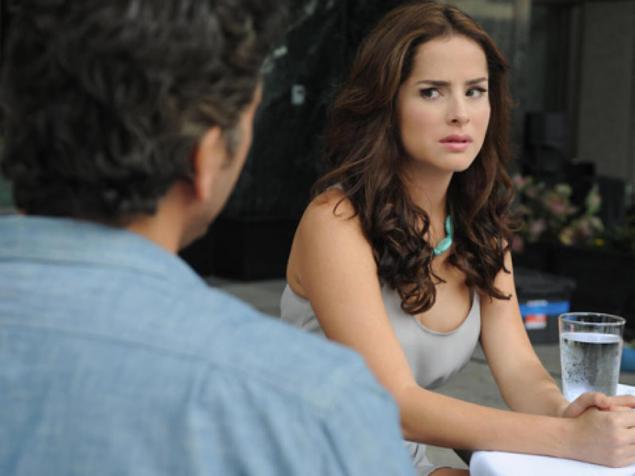721
The signs, for which you need to follow in relations
When people talk about the non-physical domestic violence, do not have in mind the occasional quarrel or ups and downs in the usual way. They talk about the models that are repeated over time. Control of behavior, attempts to shame, refusal to listen, interrupting the prosecution, emotional abuse, shouting, lies, neglect, harassment, inappropriate pressure, threats and psychological manipulation - all examples of violence
. People with "inverted" childhood, which had to "adopt" their parents or whose healthy boundaries ignored, the risk of being in a relationship more than any other. If your child's first cry, and then sweep over his wave of apologies and love, he gets confused and will often miss the signs of violence in adult relationships. If children are accused, called black white, ignored, they too will be at high risk for adult domestic violence.

If childhood is full of emotional ups and downs, the adult is very easy to equate to love this type of behavior. A child can not leave their parents, so that he or trying to "fix" them, or forgives and takes the blame.
If you, like many, had a childhood, are signs, for which you need to follow in their relations:
1. Excessive attention to the other person's needs, instead of attention to their own healthy boundaries. Over time, if you are in an abusive relationship (or grown up in a violent family), you learn to be quieter water below the grass, so as not to upset a partner. This is probably happening in the relationship with parents and unconsciously takes place in relationships with friends and colleagues. Keep quiet, do not speak, do not rock the boat, to justify bad behavior by using the phrase "I must react too violently" - all these signs that you do not listen to your inner voice. Whenever there is a question about whether or not to upset any reason, you ignore your inner voice.
2. Another sign - you will no longer spend time with your friends as often as before, because it is constantly trying to cope with yet another dramatic turn of events in the relationship. Skip social gatherings, or quarrel over the weekend instead of relaxing can be a sign that you're in a bad relationship. You can feel yourself in isolation, as a partner requires for himself most of your time. You may find that you justify the behavior of the partner and excuses him. Over time, the victim loses self-esteem and begin to question and blame yourself for all the problems in the relationship.
3. Often victims of domestic violence are beginning to hide in other areas of life, dodging any conflict. Instead of telling the truth about himself, the silence lasts - for the sake of preserving peace. Perhaps this is a habit of the relationship; maybe it's just too much fatigue after so many conflicts at home. Approval of their needs and desires becomes like a war zone, and it is easier just to adapt, to worry that it will develop into a tense situation.
4. If you grew up in an emotionally destructive family, you may not be able to really determine what you feel, what you need, what you want. Children who live with unbalanced parents, learn to put the needs of parents in the first place and take care of them. If children are not taught good boundaries, they get used to not think about their own needs and grow, ignoring them.
5. Do you find yourself in dangerous situations, such as when your partner is driving dangerously while maintaining silence, that the partner is not mad?
6. Do you feel exhausted most of the time? There you have difficulty with making decisions about herself or the fog in his mind? Did you cast doubt themselves and their needs are more likely than trust their own knowledge?
7. Do you find yourself on a regular basis in a situation where doing ......., not wanting it, just to keep the peace?
8. Does you breaks and return when you often forgive bad behavior, give another chance and believe in empty promises that are never fulfilled?

Many victims of domestic violence want to believe that their partners have changed, it is possible to start again, hope that their love can overcome all obstacles.
When children from violent families can not escape from the aggressive parent, they learn to justify bad behavior and blame themselves, and then unrealistic hope that the parent can change and do it. This cycle becomes unlearned and unconscious. True love gives and takes. Of course, sometimes you can do for a partner that something that you do not want to do, but you will feel when this happens on a regular basis.
True love between two healthy people respect borders, shared guilt when things go wrong, and looking for ways to resolve the situation without verbal violence or rage. But if once it is clear to understand truly, the past and the future is seen with such clarity that you never miss these signs. You vibrate at different frequencies, and the clarity extends to your past and the future.
You will recognize the signs that were previously ignored, and you can see the scheme, which involved ...
Insights that you understand that you have experienced, where everything happens, how to form these habits and how you will be treated in the future, come often and bring crystal clear. You become stronger and smarter, and gains the ability to offer a hand to those around, who may themselves be in such a situation.
Gradually we wake up, we say "no" and leave forever.
. People with "inverted" childhood, which had to "adopt" their parents or whose healthy boundaries ignored, the risk of being in a relationship more than any other. If your child's first cry, and then sweep over his wave of apologies and love, he gets confused and will often miss the signs of violence in adult relationships. If children are accused, called black white, ignored, they too will be at high risk for adult domestic violence.

If childhood is full of emotional ups and downs, the adult is very easy to equate to love this type of behavior. A child can not leave their parents, so that he or trying to "fix" them, or forgives and takes the blame.
If you, like many, had a childhood, are signs, for which you need to follow in their relations:
1. Excessive attention to the other person's needs, instead of attention to their own healthy boundaries. Over time, if you are in an abusive relationship (or grown up in a violent family), you learn to be quieter water below the grass, so as not to upset a partner. This is probably happening in the relationship with parents and unconsciously takes place in relationships with friends and colleagues. Keep quiet, do not speak, do not rock the boat, to justify bad behavior by using the phrase "I must react too violently" - all these signs that you do not listen to your inner voice. Whenever there is a question about whether or not to upset any reason, you ignore your inner voice.
2. Another sign - you will no longer spend time with your friends as often as before, because it is constantly trying to cope with yet another dramatic turn of events in the relationship. Skip social gatherings, or quarrel over the weekend instead of relaxing can be a sign that you're in a bad relationship. You can feel yourself in isolation, as a partner requires for himself most of your time. You may find that you justify the behavior of the partner and excuses him. Over time, the victim loses self-esteem and begin to question and blame yourself for all the problems in the relationship.
3. Often victims of domestic violence are beginning to hide in other areas of life, dodging any conflict. Instead of telling the truth about himself, the silence lasts - for the sake of preserving peace. Perhaps this is a habit of the relationship; maybe it's just too much fatigue after so many conflicts at home. Approval of their needs and desires becomes like a war zone, and it is easier just to adapt, to worry that it will develop into a tense situation.
4. If you grew up in an emotionally destructive family, you may not be able to really determine what you feel, what you need, what you want. Children who live with unbalanced parents, learn to put the needs of parents in the first place and take care of them. If children are not taught good boundaries, they get used to not think about their own needs and grow, ignoring them.
5. Do you find yourself in dangerous situations, such as when your partner is driving dangerously while maintaining silence, that the partner is not mad?
6. Do you feel exhausted most of the time? There you have difficulty with making decisions about herself or the fog in his mind? Did you cast doubt themselves and their needs are more likely than trust their own knowledge?
7. Do you find yourself on a regular basis in a situation where doing ......., not wanting it, just to keep the peace?
8. Does you breaks and return when you often forgive bad behavior, give another chance and believe in empty promises that are never fulfilled?

Many victims of domestic violence want to believe that their partners have changed, it is possible to start again, hope that their love can overcome all obstacles.
When children from violent families can not escape from the aggressive parent, they learn to justify bad behavior and blame themselves, and then unrealistic hope that the parent can change and do it. This cycle becomes unlearned and unconscious. True love gives and takes. Of course, sometimes you can do for a partner that something that you do not want to do, but you will feel when this happens on a regular basis.
True love between two healthy people respect borders, shared guilt when things go wrong, and looking for ways to resolve the situation without verbal violence or rage. But if once it is clear to understand truly, the past and the future is seen with such clarity that you never miss these signs. You vibrate at different frequencies, and the clarity extends to your past and the future.
You will recognize the signs that were previously ignored, and you can see the scheme, which involved ...
Insights that you understand that you have experienced, where everything happens, how to form these habits and how you will be treated in the future, come often and bring crystal clear. You become stronger and smarter, and gains the ability to offer a hand to those around, who may themselves be in such a situation.
Gradually we wake up, we say "no" and leave forever.
























